|
|
|
Sort Order |
|
|
|
Items / Page
|
|
|
|
|
|
|
| Srl | Item |
| 1 |
ID:
095018
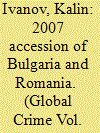

|
|
|
|
|
| Publication |
2010.
|
| Summary/Abstract |
For both objective and subjective reasons, the European Union devoted unprecedented attention to the problem of corruption in Bulgaria and Romania. The European Union (EU) faced a complex challenge in wielding its arsenal of carrots and sticks to encourage reform in the two countries. Conditionality was further complicated by rivalries between Sofia and Bucharest. Despite its limits, EU pressure presented a rare opportunity to depoliticise anti-corruption policy. After accession, Romania regressed from its previous achievements against corruption, and Bulgaria remained reluctant to prosecute senior officials or confront organised crime. Nevertheless, the European Commission continued its monitoring activities, and its ability to freeze funds maintained a modicum of pressure for reform. More effective anti-corruption efforts are possible if a domestic constituency for reform gains sufficient momentum to replace the EU's waning influence.
|
|
|
|
|
|
|
|
|
|
|
|
|
|
|
|
| 2 |
ID:
095021
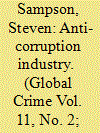

|
|
|
|
|
| Publication |
2010.
|
| Summary/Abstract |
This article describes the concept of 'industry', often used pejoratively in critiques of international development, and applies it to the field of anti-corruption. The characteristics of the anti-corruption industry, including anti-corruptionist discourse, resemble that which has taken place in development aid, human rights, civil society and gender equality. The anti-corruption industry thus includes key global actors, secondary actors who look for 'signals' and an apparatus of understandings, knowledge, statistics and measures, all of which tend to prioritise anti-corruption institutions over anti-corruption activism. It is argued that the questionable impact of anti-corruption programmes enables the anti-corruption industry to coexist along with the corruption it ostensibly is combating. Instead of viewing anti-corruption as hegemonic, we need to critically examine the consequences of the global institutionalisation of anti-corruptionist discourse and anti-corruption practice.
|
|
|
|
|
|
|
|
|
|
|
|
|
|
|
|
| 3 |
ID:
095019
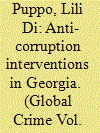

|
|
|
|
|
| Publication |
2010.
|
| Summary/Abstract |
The article aims at analysing the transfer of anti-corruption norms and standards as well as the instrumental use of anti-corruption efforts in Georgia. Drawing on the literature on anthropology and development, I use Georgia as a case study to analyse how an anti-corruption discourse is translated into local agendas. In the first part, I analyse three different perspectives on the fight against corruption in Georgia. In the second part, I examine three different types of anti-corruption interventions to illustrate the various agendas pursued by actors in the anti-corruption field. First, I study the implementation of the national anti-corruption strategy as an example of a conflict between two actors (government and international organisation) to assert the pre-eminence of a particular anti-corruption expertise. Second, I examine the reform of the Chamber of Control of Georgia (CCG), in particular the confrontation between the CCG and the Ministry of Education (MoE) in 2007, as an example of how an external anti-corruption agenda is adapted to local political struggles. Third, I analyse civil society anti-corruption projects as examples of the attempt to maintain a particular donor discourse.
|
|
|
|
|
|
|
|
|
|
|
|
|
|
|
|
| 4 |
ID:
095013
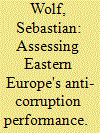

|
|
|
|
|
| Publication |
2010.
|
| Summary/Abstract |
This article compares the results of Council of Europe and Organisation for Economic Co-operation and Development (OECD) anti-corruption monitoring reports to two Transparency International instruments, the Corruption Perceptions Index and the OECD Anti-Bribery Convention Progress Report. It constructs and applies a simple typology (four-cell matrix) consisting of the combinations of good/deficient implementation of international anti-corruption provisions and high/low level of perceived corruption. As the sources and the comparative method used cannot prove causality, the article introduces three ideal types of interpretation to discuss the relevance of the anti-corruption regulatory framework in both domestic and cross-border anti-corruption policies. In the conclusion it is argued that there is a specific Eastern European pattern of anti-corruption performance that implies a need for new strategies.
|
|
|
|
|
|
|
|
|
|
|
|
|
|
|
|
| 5 |
ID:
095020
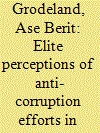

|
|
|
|
|
| Publication |
2010.
|
| Summary/Abstract |
Anti-corruption efforts introduced in Ukraine in recent years have predominantly been imposed from the outside. They have been vague, all-inclusive and lacking in political and public support. What is more, they have been fairly insensitive to the cultural context into which they have been introduced. While targeting corrupt behaviour, they have largely ignored its root causes. The impact of Ukrainian anti-corruption reform has therefore been limited. Drawing on extensive qualitative data from Ukraine, this article explores elite (i) perceptions of Ukrainian anti-corruption reform, (ii) familiarity with specific anti-corruption initiatives, and (iii) views on how best to combat corruption. Not surprisingly, Ukrainian elites are familiar with, and fairly negative in their assessment of, national anti-corruption reform. They advocate a number of measures targeting corrupt behaviour as well as its root causes with a view to reducing corruption in Ukraine".
|
|
|
|
|
|
|
|
|
|
|
|
|
|
|
|
| 6 |
ID:
095014


|
|
|
|
|
| Publication |
2010.
|
| Summary/Abstract |
This article sheds light on the European Union's (EU) efforts to facilitate the fight against corruption and promote good governance through the European Neighbourhood Policy (ENP). Our analysis shows that the level of corruption in the Eastern Neighbourhood is strongly connected to the success of democratic and economic reforms. The ENP theoretically corresponds to the complex nature of the phenomenon by placing equal emphasis on strengthening state institutions, restructuring the economy, and pushing for democratic reforms. As the EU, however, by and large seeks cooperation with state actors and pursues a 'one-size-fits-all' approach mostly based on 'soft' mechanisms such as socialisation and capacity-building, the implementation of politically sensitive reforms seems to be unlikely. Moreover, the EU potentially allows its partner governments to 'pick and chose' from the overall reform agenda and evade real political and economic change towards better governance.
|
|
|
|
|
|
|
|
|
|
|
|
|
|
|
|
| 7 |
ID:
095015
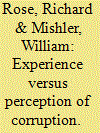

|
|
|
|
|
| Publication |
2010.
|
| Summary/Abstract |
Corruption is important because it undermines bureaucratic predictability and is a potential threat to support for a political regime. The perception of corruption is the most commonly used measure of the actual incidence of corruption. This article marshals the New Russia Barometer survey data to challenge this assumption. Even though most Russians perceive a variety of everyday public services as corrupt, this assessment is not based on first-hand experience. Only a minority pays bribes. We test four hypotheses about differences in individual perception and experience of paying bribes: the ability to pay, contact with public services, normative acceptability and political awareness. Contact is most important for paying bribes whereas political awareness is most important for the perception of corruption. We also test how much the perception and experience of corruption, as against other forms of political and economic performance, affect support for the regime. Support is driven by the substantive performance of government, especially its management of the economy, rather than by the perception or experience of corruption.
|
|
|
|
|
|
|
|
|
|
|
|
|
|
|
|
| 8 |
ID:
095017
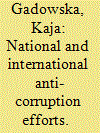

|
|
|
|
|
| Publication |
2010.
|
| Summary/Abstract |
This article's objective is to analyse the influence of international anti-corruption pressure on national measures aimed at combating corruption in Poland. First, the change in perception of corruption in Poland will be addressed, along with a short discussion on attempts to reduce its scope. Second, the anti-corruption measures of international organisations, such as the United Nations, the organisation for economic co-operation and development (OECD), the Council of Europe, Group of States against Corruption and the European Union, as well as international Conventions adopted and ratified by Poland will be examined. Third, the role of state and non-governmental institutions involved in the fight against corruption in Poland will be reviewed. Finally, the process of implementing governmental anti-corruption strategies will be analysed, with a particular focus on the introduction of legislative changes that are aimed at limiting corruption through the processes of legal modernisation and harmonisation. This article argues that from among the many initiatives undertaken by various international institutions combating corruption in Poland, the most effective was found to be pressure exerted by the European Union. Poland's eagerness to enter the European Union, and to make use of structural funds after accession, forced the country's elected governments to implement certain recommendations of the European Commission regarding anti-corruption policy. However, these activities had, to a certain degree, a facade-like character and were addressed to fulfil the formal requirements of the European Commission instead of serving as a genuine effort to curb corruption. Even though corruption has been officially considered a serious social problem, which needs to be combated and many anti-corruption measures have been implemented, the effects of the actions undertaken by consecutive Polish governments are not fully satisfactory. Also, anti-corruption slogans have been instrumentally used to fight against political opponents. From another perspective, the activities of Polish non-governmental organisations have contributed to a visible reduction in social tolerance for corruption. Although public opinion research shows that the level of corruption is slowly decreasing in Poland and the country's position in the Corruption Perception Index is systematically improving, it is uncertain how strongly rooted this positive tendency will find itself in the long term.
|
|
|
|
|
|
|
|
|
|
|
|
|
|
|
|
| 9 |
ID:
095016
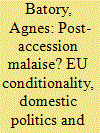

|
|
|
|
|
| Publication |
2010.
|
| Summary/Abstract |
Corruption in the then candidate countries of Central and Eastern Europe was a major concern for the European Union (EU) before its 2004 enlargement. This concern and its expression in the conditionality of membership constituted strong incentives for the candidate countries' governments to control corruption - or more precisely to take control measures that could be communicated to the European Union. A common assumption in the literature is that with the removal by accession of these incentives anti-corruption efforts would not be maintained at their pre-accession level. But is this really the case? Or have other influences from international organisations, domestic politics or civil society taken over to provide impetus for further corruption control interventions? This article considers these questions with respect to Hungary and finds that while some of the post-2004 measures have been a response to the country's international commitments, there have also been important domestic sources of reform. The results are, however, limited: despite the country's relatively smooth path to the European Union, membership of all the major international legal instruments and three major reform packages since 2000, corruption seems no less prevalent than it was a decade before.
|
|
|
|
|
|
|
|
|
|
|
|
|
|
|
|
|
|
|
|
|